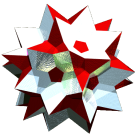- general polytopal classes:
- isogonal
links

| Acronym | bipach |
| Name | biprismatocubic honeycomb |
| Confer |
|
|
External links |

|
This isogonal honeycomb cannot be made uniform, i.e. having all 3 edge types at the same size.
The incidence matrix below shows that the vertex figure is a tri-apiculated triangular pyramid.
Note that the below provided value of c (obtained from the zero height requirement of the tegum sum), when inserted into the formula of the dihedral angle of the lacing edge of the recta results in arccos(1/[4c2/(b-a)2-1]) = arccos(1/2) = 60° = 360°/6, i.e. the below provided seemingly huge number of 6 trapezoprisms around the c-edges indeed is exact here. Note moreover that the calculated value does no longer depend on the chosen ratio of a:b !
Sure, asking that the lacing edges of the pyramid are outside to the burried pseudo edges of the medial layer triangle, might give some further restriction to the a:b ratio, which so far has not been evaluated.
Squares and rectangles here are coplanar. In fact, the cubes are situated in the vertex positions of a body centered cubic lattice, and the square prisms are situated in the edge positions of the 2 interwoven inscribed cubic honeycombs. The recta then simply interconnect those.
Incidence matrix according to Dynkin symbol
((ab4oo3oo4ba))&#zc (N → ∞) → height = 0
a < b
c = |a-b| sqrt(3)/2
o.4o.3o.3o. & | 8N | 3 3 1 | 3 6 6 | 1 3 6
------------------+----+------------+------------+--------
a. .. .. .. & | 2 | 12N * * | 2 2 1 | 1 2 2
.. .. .. b. & | 2 | * 12N * | 0 2 1 | 0 1 2
oo4oo3oo4oo&#c | 2 | * * 4N | 0 0 6 | 0 0 6
------------------+----+------------+------------+--------
a.4o. .. .. & | 4 | 4 0 0 | 6N * * | 1 1 0 square
a. .. .. b. & | 4 | 2 2 0 | * 12N * | 0 1 1 rectangle
ab .. .. ..&#c & | 4 | 1 1 2 | * * 12N | 0 0 2 trapezium
------------------+----+------------+------------+--------
a.4o.3o. .. & | 8 | 12 0 0 | 6 0 0 | N * * cube
a.4o. .. b. & | 8 | 8 4 0 | 2 4 0 | * 3N * long square prism
ab .. .. ba&#c | 8 | 4 4 4 | 0 2 4 | * * 6N recta
© 2004-2026 | top of page |